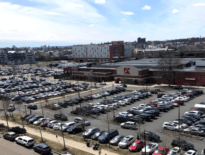A new study from Redfin has found Boston’s housing market is at a middling risk of declining prices or other negative impacts in the event of an economic slowdown.
“Home prices are high right now, but they’re high because there’s not enough supply to meet demand, which means there’s not a bubble at risk of bursting,” Redfin chief economist Daryl Fairweather said in a statement. “Most of today’s financed homeowners have excellent credit and a cushion of home equity, making them unlikely to default on their mortgage even if their weekly grocery bill grows or their stock portfolio shrinks in the next recession.”
While the Great Recession hammered home prices, any near-term downturn in the U.S. economy will not likely hurt home prices much, as they are not under pressure from the economy’s main stressors.
“If the U.S. enters a recession in the next two years, it will likely be caused by the global trade war,” Fairweather said. “U.S. industries that rely on exports, like the automotive industry and the agricultural industry, would be the most vulnerable and susceptible to layoffs. Homeowners who are laid off may not be able to continue covering their monthly mortgage payment and may be forced to sell their homes. And would-be homebuyers won’t feel so confident about making a big purchase when they don’t feel confident about their job security or their financial wellbeing. That could cause declines in home prices in markets whose economy depends on global trade, but home prices nationwide are likely to hold steady.”
Redfin’s survey covered the 50 biggest metro areas in the country, and weighed factors such as median home sale price-to-household income ratio, the share of home sales that are likely flips – sold twice within 12 months for a different price – and the diversity of local employment, measured as the probability that any two randomly selected workers are in the same field to come up with an overall risk score.
Boston ranked 26th out of 50 metros in the study, chiefly driven by the area’s high average loan-to-home value ratio, the high year-over-year growth in home prices. However, the area’s economic diversity, the low number of likely flip sales and the area economy’s low reliance on exports boosted its standing.




 |
| 


